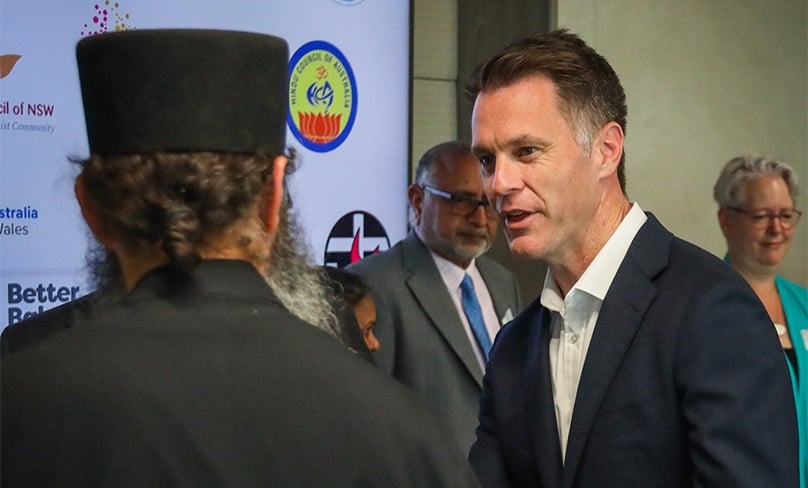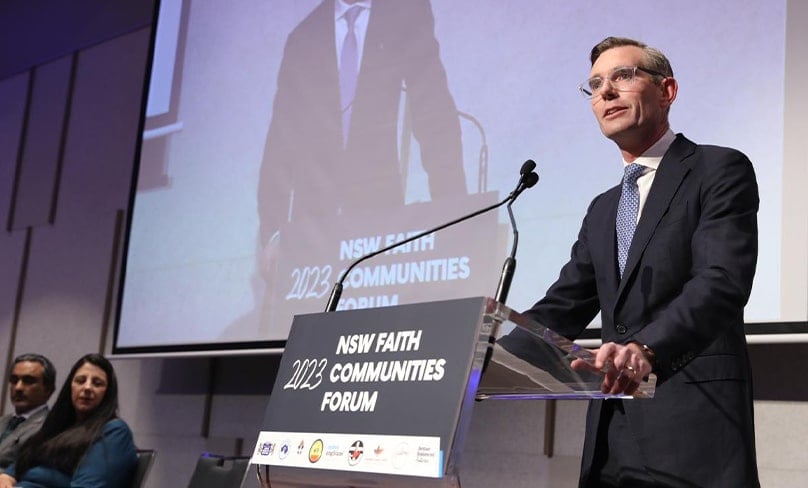
The NSW government and opposition have promised that any gay conversion therapy legislation passed in the state will not be so broad as to capture homilies, prayers, or religious instruction regarding sexuality.
Premier Dominic Perrottet and Opposition Leader Chris Minns assured voters at respective town hall meetings hosted by multi-faith leaders in Parramatta this month that any ban on conversion therapies would be written for NSW.
New laws would not copy other states where, as in Victoria, the definition of conversion therapy is broad enough to encompass prayer, faith education and counselling.
Addressing around 200 members of faith communities at the Park Royal Hotel on 22 February Mr Perrottet said, “We will not ban prayer, we will not ban preaching.”
“Taking offence at the teachings of a religious leader will not be banned, expressing a religious belief through a sermon will not be banned, and an individual, at their own consent, seeking guidance through prayer will not be banned either.”
“That is fundamental to freedom of religion in this state and in this country,” he said.
“We can ban harmful practices and protect religious freedom in our state … it’s about a balanced approach.”
The Premier gave electroconvulsive therapy and food deprivation as examples of practices that would be banned.
On 27 February Mr Minns told around 150 people gathered that if his party won the 25 March election the government would write its own legislation and not simply transpose the Victorian legislation to NSW, because it accepts the critique of the Victorian legislation from the AMA [Australian Medical Association] that the definition is too broad.
“Taking offence at the teachings of a religious leader will not be banned, expressing a religious belief through a sermon will not be banned, and an individual, at their own consent, seeking guidance through prayer will not be banned either,” he said.
“We believe that we can thread the needle, if you like, to ensure that young people who are in that position are not damaged as a result … but it’s not an easy law to land.
“We’ve seen complexities in other states and it needs to be handled carefully.”

Victoria passed similar legislation in 2021 that penalises a person who tries to suppress or change another person’s gender or sexuality with 10 years’ jail or fines up to $10,000.
Critics of the Victorian legislation said its definitions were so broad that it would silence Christian expressions of human sexuality by homilists, scripture teachers and parents.
“Unfortunately, this bill doesn’t just ban out-dated and insidious practices of coercion and harm, which we firmly reject,” the Archbishop of Melbourne, Peter Comensoli, said in 2021.
“The bill also criminalises conversation between children and parents, interferes with sound professional advice, and silences ministers of religion from providing personal attention for individuals freely seeking pastoral care for complex personal situations.”
Questions were moderated by members of the NSW Religious Communities Advisory Council, with many relating to education in faith-based schools and the proposed conversion therapy ban.
“Our position is not too dissimilar to the Perrottet Government’s, we want to see in terms of the federal response whether there is national changes because it could render New South Wales redundant.”
Only Mr Minns was directly asked whether his government would ensure schools will be able to preference members of their own faith who will teach in accordance with their religious beliefs.
The issue is a sticking point with faith leaders as the Australian Law Reform Commission’s current inquiry into faith-based education has proposed religious education reforms that would require faith-based schools to employ teachers who may not share or support the school’s religious beliefs.
“Our position is not too dissimilar to the Perrottet Government’s, we want to see in terms of the federal response whether there is national changes because it could render New South Wales redundant,” Mr Minns said.
Both leaders promised funding to support security where it is needed at places of worship, schools and community centres; Mr Perrottet to the tune of $10 million, Mr Minns increased his pledge to $15 million.
Mr Minns said his government would amend the Anti-Discrimination Act to make religious vilification unlawful within the first 100 days of taking office.
Both leaders promised to address the problem of chaplaincy services being under-supported throughout the state’s health and prison systems, and gave assurances of strong support for the funding of independent faith-based schools.
